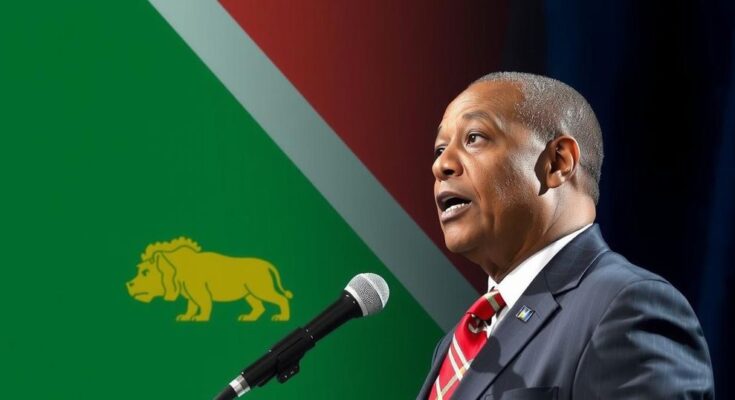Botswana’s President Mokgweetsi Masisi has conceded defeat in the recent elections, marking the end of nearly sixty years of BDP rule. Preliminary results show the Umbrella for Democratic Change (UDC) leading the race, with Duma Boko positioned to become the new president. Masisi expressed his respect for the people’s choice and commitment to support the incoming administration.
Botswana’s President Mokgweetsi Masisi has officially admitted defeat in the recent elections following preliminary results indicating a significant loss for his party, the Botswana Democratic Party (BDP), which has been in power for nearly sixty years. This week’s election has seen a notable shift in the political landscape, marking the end of a long-standing rule since the nation’s independence from Britain in 1966. Various sources, including the private Mmegi newspaper and state radio, reported that the BDP lost a substantial number of parliamentary seats. As per the latest updates from over half of the constituencies, the opposition coalition, known as the Umbrella for Democratic Change (UDC), led by Duma Boko, appears poised to secure the presidency. Duma Boko has yet to make a public announcement concerning the election outcomes. During a press conference, President Masisi acknowledged the election results, stating, “Although I wanted to stay on as your president, I respect the will of the people and I congratulate the president-elect. I will step aside and I will support the new administration.” This election was deemed highly competitive, albeit many had anticipated the BDP would triumph. As per Mmegi’s report, results from 36 out of the 61 constituencies indicate that the UDC has won 25 seats, while the BDP managed to secure only one seat at this stage. To gain a parliamentary majority, a party must win a minimum of 31 constituencies. Despite enjoying a period of stability and growth primarily due to its diamond resources, Botswana’s economy is currently facing challenges as fluctuations in the diamond market have adversely affected national revenues, intensifying the need for economic diversification.
Botswana has been a stable democracy with a robust economy primarily fueled by its diamond industry. Since gaining independence in 1966, the Botswana Democratic Party has governed the country, known for its socio-economic achievements, including free healthcare and education for its citizens. However, recent challenges stemming from a downturn in the diamond sector and subsequent economic pressures have led to a more competitive political environment, culminating in this election. The emergence of the opposition coalition has highlighted a shifting landscape where citizens seek alternatives to long-standing governance. This recent election is pivotal as it may signal a new direction for Botswana as it confronts economic diversification issues.
In conclusion, the recent elections in Botswana signify a transformative moment in the nation’s political history, punctuated by the end of the Botswana Democratic Party’s longstanding dominance. President Mokgweetsi Masisi’s concession reflects a respect for democratic processes and the will of the electorate, paving the way for the opposition coalition, headed by Duma Boko, to potentially lead the country. As Botswana endeavors to navigate economic challenges, this electoral shift emphasizes the electorate’s desire for change and new leadership.
Original Source: www.theguardian.com




